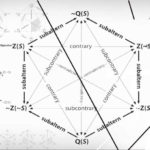We run our website the way we wished the whole internet worked: we provide high quality original content with no ads. We are funded solely by your direct support. Please consider supporting this project.
Hellenistic Philosophy and the Problem of Chalcedon
As some of you know, I’ve been immersed in Hellenistic philosophy for the last several years as part of my research for a forthcoming book tentatively titled The Myth of the Blueprint. My goal is to demonstrate the influence that certain aspects of Hellenistic philosophy had on the early church’s thinking about God, providence and evil. I’d like to share a brief reflection on my research as it relates to the Chalcedonian Creed.
The early church wrestled long and hard trying to make sense of its central belief that God became a human being in the person of Jesus Christ. It’s generally acknowledged that the definitive statement of the orthodox view of Jesus was achieved at the Council of Chalcedon (451 AD). Here it is said that in Jesus God became a human “without confusion,” “without change,” “without division,” and “without separation” (Asunchutós, Atreptós, Adiairetós, Achoristós). The goal of this statement was to affirm that Jesus was “fully God and fully human” while avoiding the twin errors of Monophysiticism (which was charged with holding the divine and human natures were “confused” and “changed” in Christ) and Nestorianism (which was charged with holding the divine and human natures were “divided” and “separated” in Christ).
The intention of the Chalcedonian creed was laudable, for the New Testament definitely depicts Jesus as one united person (contra Nestorianism) who was fully God and fully human (contra Monophysiticism). In this respect I enthusiastically affirm this creed. At the same time, I’m honestly beginning to wonder if the four negative adverbs of this creed are stating anything meaningful. Indeed, I am beginning to wonder if the creed would even have been necessary were it not for certain (in my view, mistaken) Hellenistic metaphysical and theological assumptions its authors made. Two points are worth noting.
First, it seems to me that the problem the authors of the Chalcedonian creed were trying to solve was largely generated because both they and their opponents were working with a substantival understanding of “nature.” The problem of understanding how Jesus could have two “natures” — fully God and fully human — was analogous to the problem of understanding how a certain object could be at one and the same time (say) completely gold and c0mpletely silver. The authors didn’t want to say the object (= Jesus) is a hybrid fusion of gold and silver (= Monophysicitism) nor that the object is comprised of gold and silver packed alongside each other (= Nestorianism). But how then are we to conceive of this “fully gold and fully silver” object?
The Chalcedonian creed doesn’t say. It simply asserts that Jesus is fully God and fully human in such a way that there is no “confusion,” no “change,” no “division” and no “separation.” But do these negations add anything intelligible to our conception of how Jesus is fully God and fully human? I do not see that they do. (I have elsewhere suggested the problem can be avoided if we define “nature” as a “disposition” [following Jonathan Edwards] rather than a “substance” [see Trinity and Process, Lang, 1992]).
Second, and even more importantly, I suspect the problem this creed addresses is in principle unsolvable not only because of the assumption its authors make about “nature” in general but because of certain assumptions they make about the “nature” of God in particular.
To begin to flesh this out, consider: What is so problematic about simply affirming, with Scripture, that “the Word became flesh”[ho logos sarx egeneto] (Jn 1:14)? What is so difficult about affirming that the all-powerful God decided to be God in a new way – namely, as this human, Jesus Christ? I submit that there is no problem – unless one makes assumptions about the “nature” of God that are inconsistent with his becoming a human.
If we derive all of our conclusions about the “nature” of God from Jesus Christ — the one who said, “If you see me you see the Father” — then obviously it would be impossible to ever arrive at an understanding of the “nature” of God that was not consistent with his becoming a human. All of our theological reflection will be predicated on the fact that God did become human. But if we base our theological reasoning on any other source, then it will not only be possible that we will arrive at conclusions that are inconsistent with the claim that God became a human: it’s almost inevitable that we will do so.
By the time we get to the fifth century, I argue, church theologians had embraced an understanding of God that was not entirely predicated on the Incarnation but was rather largely rooted in Hellenistic philosophy.
There had been a long philosophical tradition going back to Xenophanes (c,570-480 BC) that reacted strongly against the anthropomorphic gods of popular Greek (and later, Roman) religion. In place of these all-too-human gods, this philosophical tradition (which I call “the Xenophanes tradition”) posited a single, supreme God and defined him by sharply contrasting him with humans and everything else in the physical world.
For example, humans have emotions and suffer, so the Xenophanes tradition posited a God beyond emotion and beyond suffering (impassible). So too, humans and everything else in the physical world are contingent and subject to change, so the Xenophanes tradition posited a God who was altogether necessary and above all change (immutable). And everything in the world is physical and subject to time, so the Xenophanes tradition eventually posited a God who was altogether incorporeal and above time.
This anti-anthropomorphic, transcendent view of God intensified over time, especially in the schools of Middle Platonism, Neo-Pythagoreanism and Neo-Platonism. God became increasingly defined in hyper-transcendent terms. It was widely held that we cannot say anything positive about what God is, only what God is not. Some philosophers (especially Neo-Platonists) went so far as to say that God is “beyond being and essence.” Now, this way of defining God’s nature created a problem. It made it increasingly difficult for philosophers to account for how an immutible, timeless God relates to the ever-changing, temporal world.
This is, in significant respects, the same problem the authors of the Chalcedonian creed were confronting, except that instead of a God-world problem, they were wrestling with a God-individual problem. What’s most interesting is that, especially in Plotinus and subsequent Neo-Platonists, we find this problem being addressed using negative language that anticipates the negative adverbs of Chalcedon. Just as they could only define God in terms of what he was not, they could only specify his relation to the world in terms of what it was not. (On this, see A. H. Armstrong, “Plotinus and Christianity,” in S. Gersh and C. Kannergiesser, Platonism in Late Antiquity. University of Notre Dame Press, 1992, 115-129.)
Now, I’m not suggesting the authors of Chalcedon consciously borrowed Neoplatonic terms, but neither do I think the parallels are coincidental. For it is beyond dispute that the church fathers of the 5th century (and before) embraced a definition of God’s “nature” that in significant respects agreed with the Xenophane’s tradition. Permeating their writings are ascriptions of God as impassible, immutable, “above” contingency, “beyond” time, etc.
The question, then, is how a God whose very definition is anti-anthropomorphic can become a human? How does a God whose essence is above time and change become anything new? How does a God who is above emotion and suffering suffer and die on the cross? This is the God-world problem of the Xenophanes tradition, but with a vengeance! And, so far as I can see, there is no coherent answer to these questions. The most that can be said is that it happened Asunchutós, Atreptós, Adiairetós, Achoristós. But, as I’ve said, that hardly renders the concept coherent.
IF we instead start and end all of our theological reflection on the person of Jesus Christ, I suggest we will not be inclined to define God in contrast to humanity and the world, and thus will have no philosophical problem affirming that God became a human in order to save the world. Had the early church fathers remained Christocentric in their theological reflection and shunned the excesses of the Xenophanes tradition, it might have been enough to simply affirm, with Scripture, that Jesus is fully God and fully human.
Think about it.
Category: General
Tags: Philosophy
Related Reading

The Logical Hexagon Made Simple
by: Greg Boyd The Hexagaon in a Nutshell For those of you who don’t have the twenty to thirty minutes it will probably take to read this essay but who nevertheless would like to have some idea of what the Logical Hexagon is all about, here is my two sentence elevator speech: The Logical Hexagon…

Can Life Have Meaning Without God?
Article by Dan Kent King Sisyphus (“Siss-uh-fuss”) was a mythical king who enjoyed killing random travelers and starting wars. He killed for pleasure. He killed for profit. He killed for pride. When he died the gods showed him no mercy. The wicked king was condemned to spend eternity pushing a mighty rock up a hill.…

Lighten Up: Existential French Cat
Greg used to be into the existentialists quite a bit. Sartre and Camus would love this cat. (Thanks to Rachel Held Evans for the heads-up.)

Crucifying Transcendence
The classical view of God’s transcendence in theology is in large borrowed from a major strand within Hellenistic philosophy. In sharp contrast to ancient Israelites, whose conception of God was entirely based on their experience of God acting dynamically and in self-revelatory ways in history, the concept of God at work in ancient Greek philosophy…

Free Will: An Aesthetic Model
Greg continues his thoughts on free will by offering an aesthetic model for free will. This one gets pretty philosophical, but it’s worth toughing it out.

Greg Uncovers Flaws in Aquinas, and It Could Change Everything
In this episode Greg shares some intriguing insights about Aquinas and Aquinas’ concept of God.
